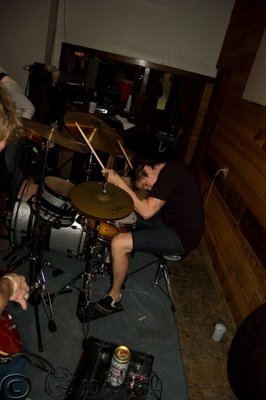I've just discovered this incredible blog for African music fans.
Awesome Tapes from Africa.This stuff is driving me nuts lately... there's so much remix potential here... these tracks are begging for Westerners hands to drop some psych-noise drums, some
Dub Step bounce, some distorted depravity. Those vocals speak to everyone. This site collects tunes from cassette tapes featuring African musicians - cassette is still the preferred medium in Africa, especially Ghana, where many of these tracks come from. Impassioned vocals, polyrhythms that give the drummer in me a big stiffy - there isn't much more I can say about this music.
 Moolobali - "Joulaou" .mp3
Moolobali - "Joulaou" .mp3I mean, seriously that's such a fascinating rhythm, it's hypnotic and spiritual. The direct descent of this performance is
John Coltrane's "A Love Supreme." You can't argue with that. The repetitive theme, the impassioned vocals so reminiscent of Coltrane's best performance, a one-on-one conversation with God herself.
 Miriam Bagayogo - "Miniyan Ye Koloni Mme" .mp3
Miriam Bagayogo - "Miniyan Ye Koloni Mme" .mp3Blues anyone? C'mon, this is right up there with
Mississippi John Hurt or some
Muddy Waters shit. This is
African Blues - the third cousin twice removed of American Blues. Can we not say listening to this that American blues is a direct descendent of the same African tradition that birthed this music. Can we also not say then the capoeira and bboying are distant cousins also??
Interesting in searching for more on
Miriam Bagayogo, I came across this gentleman,
Issa Bagayogo, I assume a descendent> Son, perhaps. Similar to M. Bagayogo's vocal tradition, but with a decidedly "New Age"-ish backing track. This is Patchouli pop, I call it. Only one track to hear, and while Issa proclaims his music to be "Afro-beat" it most certainly is not. What it
is, is the type of music that gives "World Music" a bad rap.
Hang on a second while I get something of my chest... cough... excuse me... UM.... THIS GUY HAS A MYSPACE?!? Say what you will open this lovable online community cum monster that Tom has created but Jesus Christ. Issa Bagayogo has a vehicle through which to share his music with the world. You GOTTA give props for that, seriously!
One more...
Souley Kante - "Bi Magni" .mp3I was unsure if I was going to feature this track for a second, but only a second... well more like 2:30... essentially the midpoint of this jam band inspiring jam track. The bass solo at this point in the session dissects the rhythm with a certain level of insanity. That might not even be a "bass" in the Western sense but some other African bass-like instrument I am at this point unaware of.
And on a final note: I'm really digging this shirt.

Really digging it. Man the information is out there... diamonds are crippling Africa. It's a new form a slavery - we keep the entire continent in a perpetual state of war, because people in constant states of chaos are easier to control. Chaos creates fear and fear creates dictatorships.
Finally, for a laugh:
Ata Kak... ;) ... this guy is huge in Ghana. HUGE.


